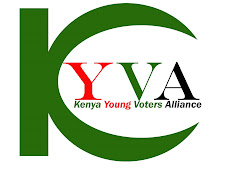KYVA is a conglomerate of organizations and individuals committed to ensuring that Kenya as a country manages to achieve set developmental goals to meet both the international and national targets. The idea was mooted by the (SONU) leadership of 2003/4. KYVA leadership is composed of diverse backgrounds and experiences. We urge all Kenyan youths to take charge of leadership at the counties and national levels. Register as voters and vote in large numbers for young visionary leaders.
Saturday, October 24, 2009
MORE CONSTITUENCIES: IS IT A QUEST FOR FAIR REPRESENTATION OR GERRYMANDERING?
Dear Sir/Madam,
The quest for fair political representation has been with us for quite some time. This arose after the realization that the British Electoral System adopted by Kenya since independence brought about glaring inequalities among the electorate. With rapid population growth; and with no clear criteria for the creation of constituencies; constituencies were created left, right and centre to favour the rabid political interests of the incumbents.
Today, the fundamental question still remains the extent to which the country`s electoral system can facilitate fair representation of its competing electorate interests. As was largely expected, a section of legislators from populous regions are demanding for more constituencies to reflect a one-man-one vote formula. Behind this façade is the thinking that each MP in Kenya is to represent the same number of people. In other words they are demanding the lion’s share of the proposed constituencies.
On the other hand is a section of legislators from sparsely populated regions who demand that additional constituencies must be based on one-kilometer-one-vote formula. In other words; geographical size. This means that the sparsely populated but expansive arid and semi arid regions will, using this formula, claim the largest share of the proposed constituencies. (The debate is expected to become sizzling hot when legislators from the moderately populated regions enter the fray).
In my view, both arguments are extreme in nature and are far removed from fair representation as is understood from a reasonable man`s point of view. They all border on political gerrymandering. Fair representation demands for a formula that best serves the country`s national democratic aspirations while balancing the peculiarities of the country.
The peculiarities to be considered include ethnic diversity, geographical size, level of economic development and civic awareness. For instance, if it were not for the ethnicization and polarization of Kenyan politics there would be no problem of creating new constituencies based on population size with minimal consideration given to other factors.
As it stands now, many people will be hesitant to accept that the clamour for fair representation (whether viewed through the lenses of geographical size or population) is informed by the politics of the devolution of resources in constituencies. I tend to think that the current formula that takes into consideration the constituency`s population and its poverty index has effectively brought about the equitability in devolved resources. The real argument behind this latest move has therefore more to do with how votes cast in an election will translate into seats won by political parties and by extension how the same seats shall determine who become(s) the country`s Chief Executive(s).
We all know that were this method to be adopted by the Interim Independent Boundaries Commission (IIBRC), then unholy alliances between at least two populous ethnic groups would forever ensure that whichever electoral system or a combination of electoral systems the country adopts, the top leadership in this country will almost certainly be determined by the odious ethnic driven merry- go- rounds.
This is a situation that is likely to engender secession sentiments among a section of the electorate. This is because protracted conflicting ideologies over pertinent national issues coupled with greed for raw political power has historically been known as ideal conditions for secession.
I doubt that this is what we want for our nation. I am convinced that with sobriety we can agree on a formula that will bring about fair representation without appearing to trample upon the inalienable rights of others. The onus lies with our political scientist as well as other think tanks to come up with the Solomonic wisdom to pull us out of this morass.
TOME FRANCIS,
BUMULA CONSTITUENCY.
Subscribe to:
Comments (Atom)
